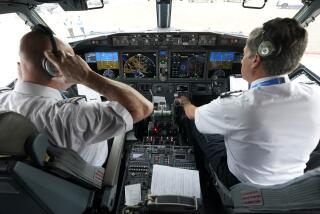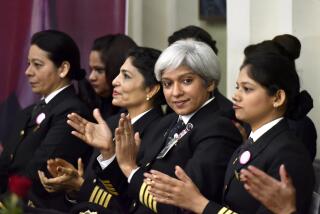Pilot sickout the latest problem to hit India’s aviation industry
- Share via
NEW DELHI — Hundreds of Air India pilots did not report to work Thursday, the fourth day of a sickout to protest their treatment by management, a dispute that so far has resulted in the cancellation of numerous international flights and cost about 45 pilots their jobs.
Officials said the Mumbai-based airline was forced to cancel more than 35 international flights this week, including several bound for New York and Frankfurt, because of the protest. India’s aviation minister called the sickout illegal, the airline said it had fired some pilots, and a high court called for negotiations.
Separately, dozens of Kingfisher Airlines pilots called in sick to protest delays in salary payments, forcing that carrier to cancel some domestic flights.
“No it’s not some sort of new bird flu,” said Harshwardhan, an aviation analyst and former Air India employee who uses one name. “Today it’s the pilots striking, tomorrow Air India office workers, the next day cabin crew. Unfortunately, this is a regular feature.”
Labor disputes are the latest problem to afflict the aviation industry in India, which has been beset by cases of drunk pilots, fake pilot licenses, allegedly corrupt regulators, dodgy flight schools and carriers cutting corners on safety.
“It’s pure luck we’ve had no major accident lately,” said Ananthkrishnan Ranganathan, a member of the safety committee advising the aviation ministry. “It’s just a matter of time.”
Air India’s labor problems date to at least 2007, when two troubled government airlines, international Air India and domestic Indian Airlines, announced they would merge into Air India. But there’s been little integration, say analysts and former staff members, in an industry prone to tribalism, nepotism and political meddling.
The sickout this week involves a contention by pilots who worked for Air India before the merger that they have sole rights to fly new Boeing 787 Dreamliner aircraft, rather than splitting the jobs with former Indian Airlines pilots as management ordered. Despite huge airline losses and other problems, pilots have also demanded higher pay, faster promotions and first-class seats when traveling as staff, prompting one newspaper to suggest facetiously that they be served champagne to prevent more tantrums.
“They’re on an ego trip,” Suresh Maharidhi, 52, an accountant, said Thursday at New Delhi’s Indira Gandhi International Airport, waiting for his Air India flight to Bhubaneswar. “It’s wrong.”
The U.S. Department of Transportation last week fined Air India $80,000 for violating customer service requirements; last year, the Star Alliance carrier network suspended its plan to include India’s flagship airline as a member.
The Indian government last month extended Air India a $6-billion bailout, the latest of several for the airline. Despite high passenger volumes, five of India’s six airlines are losing money, the result of high taxes, steep airport fees, overregulation and other issues, analysts say.
In response, several carriers have delayed paying their pilots and cabin crews. Thursday’s sickout at Kingfisher, which faces debts of $1.4 billion, involved pilots’ unpaid wages, some extending as far back as January. Jet Airways and Air India are also months behind in paying pilots and other crew members.
Meanwhile, the government released a report last month that said many pilots and cabin crew members had reported to work drunk this year. The industry is also dealing with a scandal over pilot licenses after IndiGo Airlines Capt. Parminder Kaur Gulati landed her aircraft in western Goa state on its relatively fragile nose wheel last year, a dangerous mistake. It turned out that wasn’t her first such landing and that she’d obtained her license fraudulently after failing the test seven times.
Further investigation by authorities unearthed fake pilot licenses at several other airlines and a string of questionable flight schools, often run by former pilots, reportedly granting commercial licenses to students flying a fraction of the required 200 hours and failing to meet other requirements.
The safety director and a licensing official with India’s industry regulator, the Directorate General of Civil Aviation, reportedly were suspected of issuing fake licenses to their relatives and to those of aviation ministry officials and senior pilots.
A safety audit by the directorate general leaked to the media in January indicated that all major Indian airlines were compromising on safety to cut costs. Problems included failing to maintain crucial data needed for safe flights, inadequate software needed to monitor the flight data recorder and failing to investigate incidents seriously.
This follows a string of smaller incidents in recent years, including pilots falling asleep, overshooting their targets and having fights in the cockpit, including a 2009 brawl in front of passengers. The problems have led to finger-pointing among pilots, management and regulators, who say reduced staffing levels are responsible for inadequate oversight. “It’s an organization with huge responsibilities and limited manpower,” Directorate General Bharat Bhushan said at a public forum in February.
At the New Delhi airport Thursday afternoon, bank manager U.C. Sharma learned that his Air India flight had just been canceled.
“They’ve left us stranded like stray animals in the road,” he said. “When you hear about all these problems, you can’t help but get scared. Sometimes I pray. This can’t help our international reputation.”
More to Read
Sign up for Essential California
The most important California stories and recommendations in your inbox every morning.
You may occasionally receive promotional content from the Los Angeles Times.













